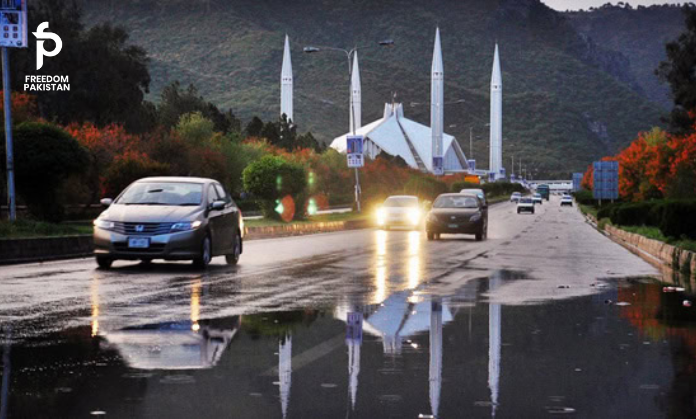The recent inauguration of a new underpass in Islamabad was met with much fanfare. The project promised smoother traffic flow and a respite from long-standing congestion. Yet, after the first monsoon rain, the underpass suffered unexpected damage — a scene that left many residents disheartened and questioning the quality of its construction. In a city that prides itself on meticulous planning and natural beauty, the sight of a crumbling new infrastructure project came as a shock and sparked a heated debate about accountability, engineering standards, and long‑term urban planning.
Damage of Islamabad Underpass
Within hours of the first downpour, reports surfaced about the damage at the freshly built underpass. The damage varied from surface erosion and deep cracks in concrete walls to flooding caused by insufficient drainage. Motorists were forced to navigate rising water and deteriorating surfaces, creating traffic jams and putting commuters at risk. The underpass, located on a busy thoroughfare in the heart of Islamabad, quickly became a symbol of infrastructural fragility.
Several areas around the underpass exhibited signs of subsidence, with pieces of asphalt breaking apart and water pooling in dangerous quantities. The damage was not only cosmetic — engineers on site confirmed that certain sections required urgent inspection due to fears about structural integrity.
Location and Its Importance of Underpass
The underpass connects vital sectors of Islamabad and serves as a lifeline for daily commuters. Its strategic location was meant to reduce congestion and save valuable time. At its inauguration, city authorities lauded it as a state‑of‑the‑art facility that would redefine traffic flow in the area. Its premature deterioration is being viewed as a setback for Islamabad’s ambitious infrastructure development agenda.
Public Reaction
As images and videos circulated online, residents expressed a mix of anger, frustration, and disbelief. Social media platforms were flooded with posts and tweets questioning how a freshly inaugurated project could deteriorate so quickly. The hashtag #IslamabadUnderpassFailure gained traction, capturing the collective sentiment of a public tired of delays, cost overruns, and poorly executed infrastructure.
“Where is the quality control?” one user commented, while another stated, “We deserve better for the taxes we pay.” The public outcry quickly gained momentum, putting pressure on authorities to respond.
Official Response
In a press briefing following the public outcry, the Capital Development Authority (CDA) acknowledged the damage and announced an investigation. An official statement emphasized that a review of construction standards and engineering practices would be conducted. According to the CDA, early findings suggested that the damage was caused by unprecedented rainfall combined with design and drainage deficiencies.
A spokesperson stated, “We are conducting a thorough assessment and will ensure that necessary corrective measures are implemented immediately. This is a priority for the CDA, and accountability will be enforced where required.” The statement promised both short‑term repairs and long‑term structural improvements.
Why This Matters
The damage to the underpass is more than just a single infrastructural setback. It highlights deeper issues about the quality and durability of public construction projects across the country. As Islamabad grows, its infrastructure must evolve to accommodate increasing traffic, climate variability, and environmental challenges. Projects that fail to consider long‑term planning and resilience quickly become liabilities rather than assets.
Moreover, incidents like this can undermine public trust. When taxpayers witness the results of multi‑million‑rupee projects falling apart within weeks, skepticism about how their money is spent intensifies. In a city grappling with other infrastructural concerns — from water scarcity to waste management — accountability and quality control are critical.
Previous Similar Incidents
This is not the first time Islamabad has witnessed infrastructural failures soon after a launch. In 2022, a newly constructed bridge developed cracks due to soil erosion caused by monsoon rains. Similarly, several underpasses and overpasses across the city have been prone to flooding due to inadequately planned drainage systems.
Each time, authorities have promised improvements, and each time, citizens have hoped for better results. Yet the recurrence of such incidents points to systemic issues in the planning and execution of public works. Critics have long argued that many infrastructure projects emphasize rapid construction and inauguration over long‑term quality and resilience.
Future Plans for the Underpass
According to CDA sources, an immediate inspection team has been mobilized to assess the full extent of the damage. The team includes civil engineers, design experts, and independent auditors to review both the design and construction phases.
Short‑term measures announced by the authorities include:
-
Temporary patching and resurfacing of damaged areas.
-
Pumping out water and clearing blocked drains.
-
Reinforcing critical sections of the underpass.
Long‑term measures being considered involve:
-
Redesigning the drainage system to manage heavier rainfalls associated with climate change.
-
Conducting a review of structural design and quality of materials used.
-
Revising tendering and quality assessment procedures for future projects.
-
Involving independent oversight bodies for inspection and accountability.
Implication for Government and Contractors
This incident has also thrown the spotlight on the role of contractors and their accountability for the quality of work delivered. In a country where construction delays and quality concerns have long been contested, this underpass serves as a case study in the urgent need for enforcement of quality standards.
Government authorities have promised to review existing construction policies and implement stricter penalties for contractors failing to adhere to agreed standards. This approach aims to reduce the risk of a recurring cycle of infrastructure failures and restore public trust.
Economic and Social Costs
The underpass’s damage has an economic toll that goes beyond repair costs. The disruption caused by its partial closure affects businesses, delays commutes, and impacts the quality of life for residents. The financial implications also extend to taxpayers, who bear the cost of both the initial construction and subsequent repairs.
From a social perspective, incidents like this deepen skepticism about the efficacy of public institutions and their ability to deliver long‑term, resilient infrastructure. The psychological toll of repeated infrastructural failures can lead to a sense of apathy and mistrust within the community.
A Growing Need for Climate‑Resilient Infrastructure
The recent downpour in Islamabad serves as a reminder of the urgency for climate‑resilient infrastructure. Pakistan is increasingly experiencing unpredictable and intense weather patterns due to climate change. As such, future infrastructure projects must be designed to withstand environmental stressors.
From drainage design to material selection, every aspect of construction needs to be reevaluated in the context of a warming planet. Public institutions must collaborate with climate scientists, engineering experts, and environmental planners to build a more resilient urban landscape.
Learning from Mistakes
While the damage to the underpass is a setback, it can also be a pivotal learning moment for future projects. Transparency in audits, accountability for stakeholders, and public engagement can transform moments like these from setbacks into opportunities for institutional growth and improvement.
Citizens have a right to demand high‑quality infrastructure that serves its intended purpose reliably and sustainably. The government has a responsibility to listen and respond, ensuring that the lessons learned today shape better outcomes for tomorrow.
Conclusion
The damage sustained by Islamabad’s new underpass after its first monsoon rain serves as a symbol of deeper systemic issues. Inadequate planning, insufficient quality controls, and an under appreciation of climate resilience have combined to create a crisis that threatens both infrastructure and public trust.
Moving forward, Islamabad and other Pakistani cities must adopt a holistic approach to infrastructure design and construction — one that prioritizes long‑term durability, accountability, and responsiveness to environmental changes. By doing so, Pakistan can build a future where its urban spaces are not only functional and efficient but also resilient, sustainable, and worthy of the public’s trust.
You Can Also Read This




